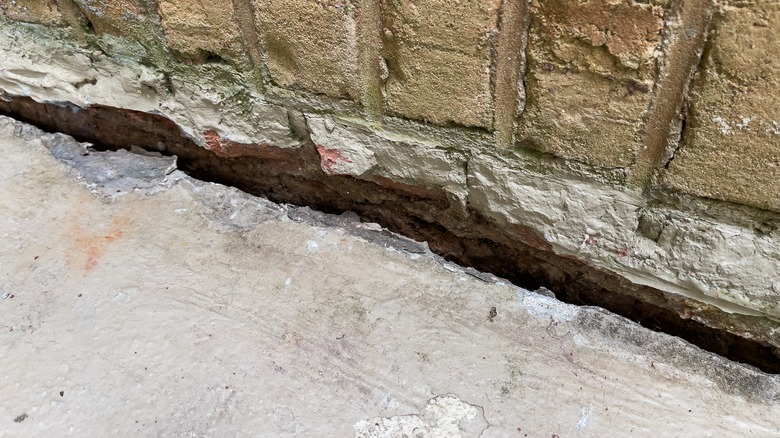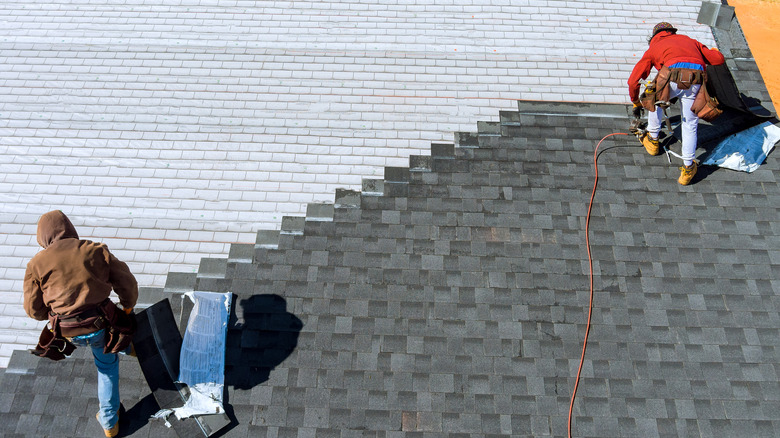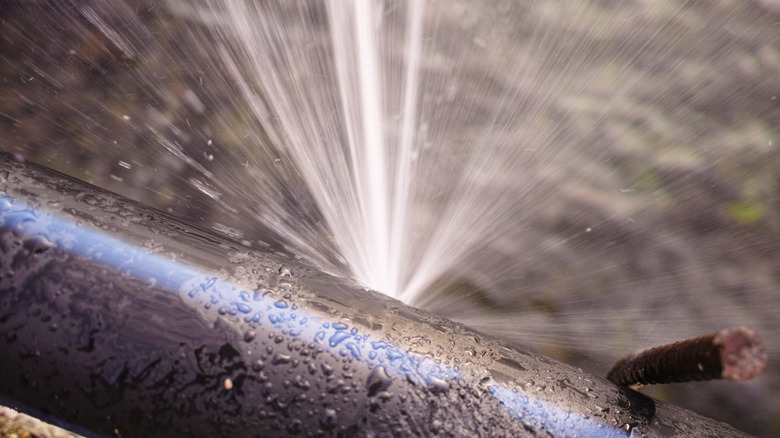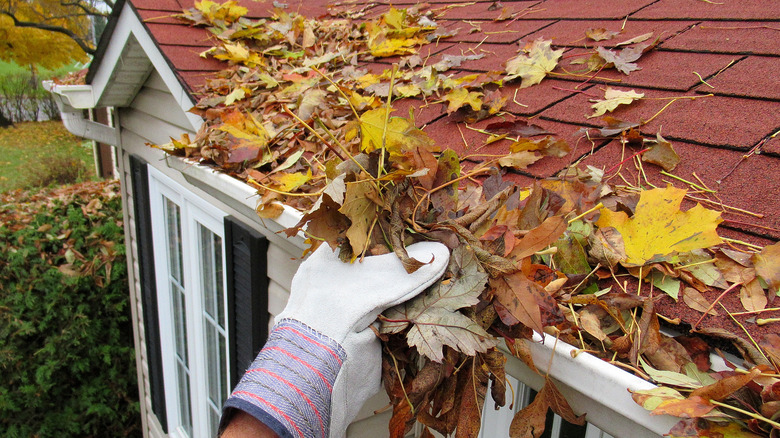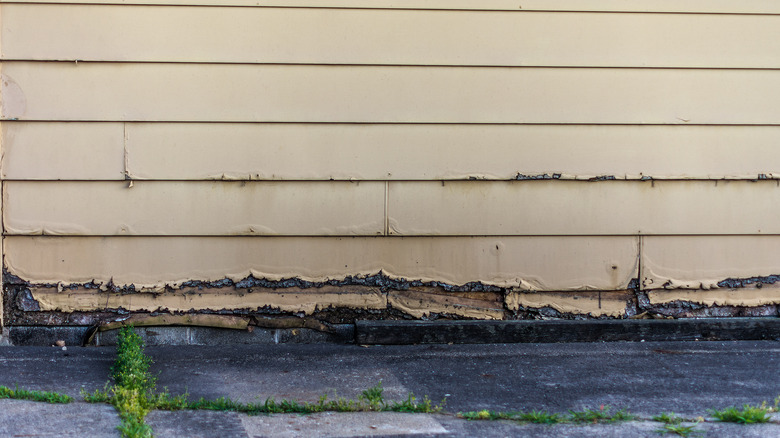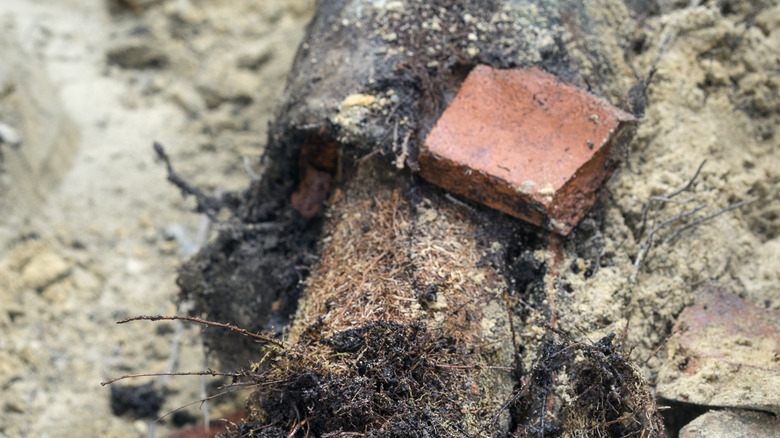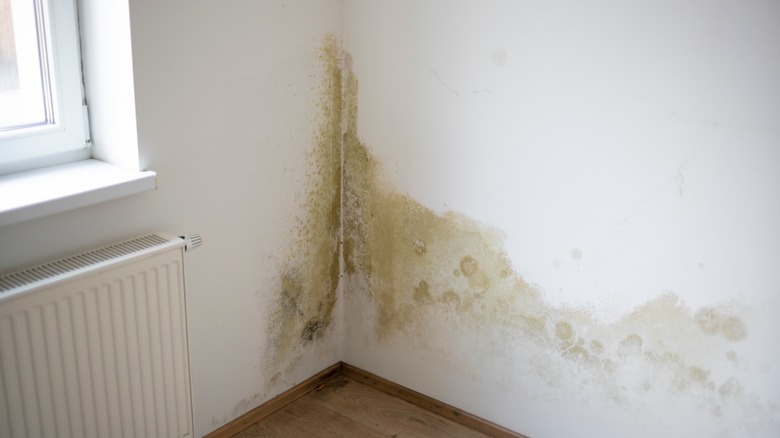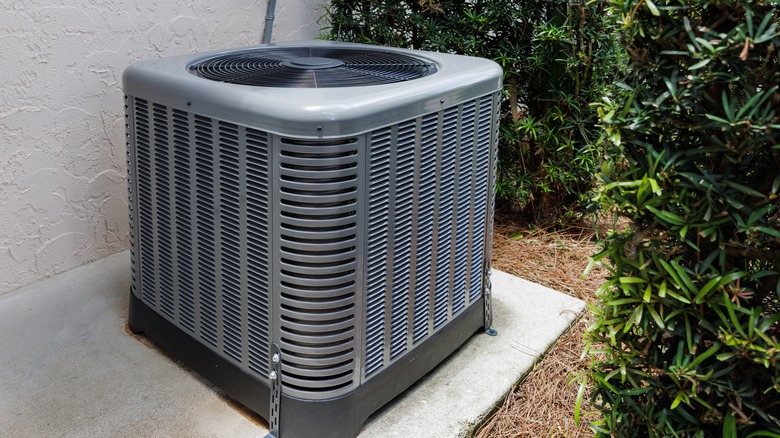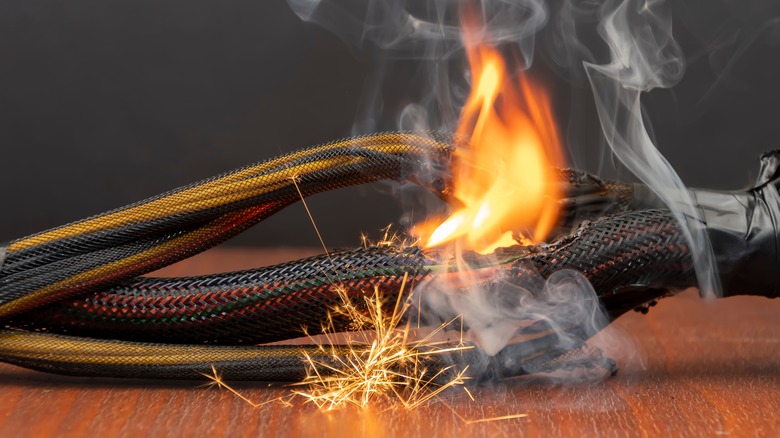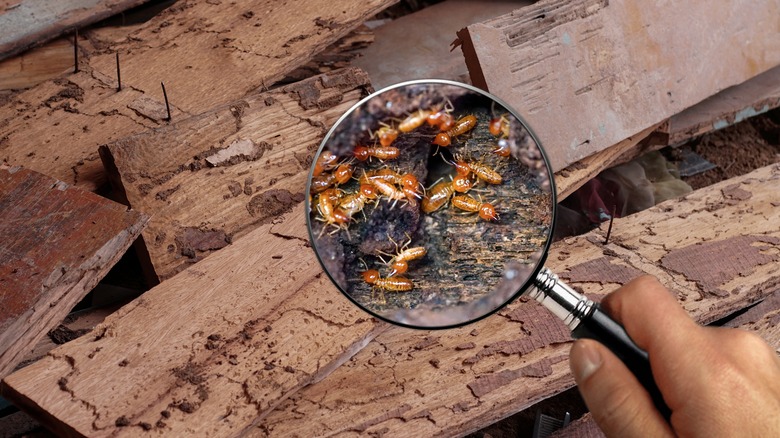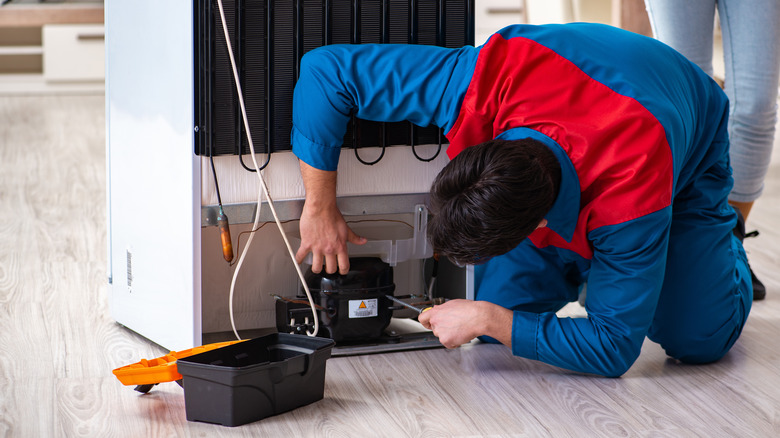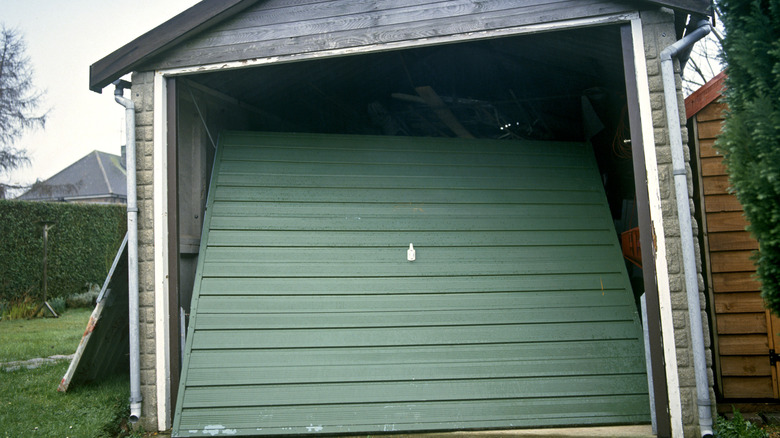The Most Common Surprise Repairs And How To Avoid Them
Home maintenance can be expensive, especially if you are not planning for it. According to Wells Fargo, setting aside a monthly budget for property upkeep as a homeowner might be able to lessen the blow a little bit. You can also lower the overall bill by having home maintenance be top of mind. If you are regularly checking for updates and repairs, you might be able to catch a disaster before it happens, offsetting the clean up costs.
That said, the bank recommends saving up about 1% to 2% of your home's total price for maintenance each year. So if you live in a $350,000 home, you would need roughly $3,500 to $7,000 a year to keep things running smoothly. In the beginning, this might seem like a lot and it can be painful to set aside — especially after ponying up for the down payment and closing costs. But, over the years, as the home continues to age, having extra cash on hand can cause less stress in the long term. Even so, some things can just sneak up on us, so here are the most common surprise repairs and how to avoid them.
1. Sinking or settling foundation
Repairing your home's foundation tends to be a very expensive experience. According to HomeAdvisor, the bill starts at around $5,000 for smaller repairs. If the foundation has really deteriorated and the home needs to be lifted, you are easily looking at a bill above $10,000. Different foundations require different levels of care, but the prices tend to be around the same amount.
Foundation issues can occur for various reasons, so it is important to stay ahead of them to avoid the bill. Sometimes, damage can occur when the area under your home isn't properly sealed. Moisture can then seep in, causing sinking, cracking, and bowing to your home's foundation. Before you purchase your home, include the foundation's health in the list of things your home inspection looks out for. This way, you can be aware of any potential problems for the current owners to fix before you move in. If there are weak spots, you can also keep an eye on things before things crumble. If you have a basement or crawl space, often check for any signs of sagging or uneven flooring, as these can be signs of foundation stress.
2. Roof replacements
If you don't keep up with your roof maintenance, you risk a bigger bill down the line. According to Sheegog Contracting, delaying small roof issues typically causes a domino effect. For example, ignoring a small leak or weak spot in your roof's covering often means your home could suffer massive water damage in the future, up to and including a section of the roof caving in. Not only that, but you could be subjected to substantial cleaning fees to rid your house of the mold associated with the presence of excess moisture. Poor roof maintenance can also let unexpected guests like raccoons and reptiles take up residence in your attic.
For this reason, you must keep diligent records of your roof's condition. When you purchase the house, make a point to ask about the history of the roof. When was it last replaced? What repairs have been carried out? From there, make a note of all maintenance that you have performed on the roof as well. Most contractors recommend you have a roofer come out and inspect the health of your roof every few years to keep an eye out for any weak spots you may have missed. Being proactive like this will cost you a small amount in a service fee, but can save you big money in repairs down the line.
3. Burst pipe
When there is a big freeze, one of the most common injuries your home can suffer is a burst pipe. Typically, a pipe bursting is nothing short of a disaster. It impacts the water flow to the rest of your home, not to mention all of the water damage to the area immediately surrounding it. Sometimes, you might not even know the pipe has burst until it's too late, as it is hidden behind a wall and the water builds up.
Luckily, according to Hope Plumbing, it doesn't have to be this way. A great prevention step is to check the forecast for any upcoming sharp drops in temperature. As a precaution, let your faucets drip instead of turning them off. Keeping water moving can work to prevent freezing. In addition, consider wrapping some of your more vulnerable pipes with heat tape. These could be exposed or older lines, but it's best to consult with a local plumber for the best locations within your home. Finally, comb through your house with an eagle eye for possible air leaks. They could be around vents, wiring ports, or even where the pipes enter from outside. Seal up these pathways (even if they are tiny) using caulk or insulation foam to ensure that cold air stays out.
4. Clogged gutters
Clogged gutters are the starting point for a domino effect of more expensive repairs. According to Erie Insurance, an ignored gutter can be the start of foundation issues. Think of it this way: With some quick math, 1 inch of rain is about the same weight as 1,200 gallons of water when spread out over a 2,000-square-foot house. If your gutters are clean, the water is quickly whisked away. However, if they're clogged, the water builds up, spills over, and can ruin your foundation. Over time, this can cause significant issues like cracks and sagging.
In the short term, a clogged gutter can really be a danger to itself, as the weight of leaves, mud, and water can rip it off the side of your home, causing damage to your siding and windows. Before it breaks, this buildup can cause water to seep into your walls, causing wood rot and mold damage. It can also be a breeding ground for insects and other pests. To avoid all this, it's better to bring out the ladder and a pair of gloves every once in a while (more in the fall when the trees are shedding) to clean the gutters. It's not a fun chore, but it will save you heaps of money.
5. Rotted siding
Wooden siding is, unfortunately, susceptible to rot. There are a lot of potential causes for this, like initial poor construction, clogged gutters and poor drainage, a burst pipe, or even a leak in the roof with a trickle-down effect. You'll start to notice that many home repairs are extremely interconnected. According to Northface Construction, acting quickly is the key to avoiding a larger bill.
Homeowners tend to gravitate towards wooden siding because of its classic look. When one or two boards begin to show signs of aging, they might put off replacing the weak links because of appearance concerns. After all, it can be difficult to find the exact type of wood to repair the siding, and most homeowners don't want a mismatched job. Unfortunately, just like one bad apple spoils the bunch, rot on wooden siding tends to spread quickly. To avoid a larger bill down the line, the time to act is as soon as you notice signs of damage. If the exterior of the siding has any holes or cracks, moisture has already started working its way into the board's core.
You can easily cut away one rotten board and replace it on your own. If the holes were caused by pests or weather, you could also patch up the holes using caulk or putty. Be sure to add a special sealant to the wood when you are finished to ensure your repairs last long term.
6. Sewage backup
Sewage backup is an expensive (and gross) problem to deal with. According to the Insurance Information Institute, if you live in an area that has been developed for decades, the local sewer system might be aging. While maintaining the system as a whole falls to local municipalities, the part known as the sewer lateral is your responsibility as a homeowner. This is the part of the pipe that connects a private home to the public sewer facilities, which might be at the other end of the street. If you assume everything is out of your domain, you can easily run into problems like backup and overflow.
To avoid any issues, be sure you are disposing of waste properly. Substances like grease or paint should never be poured down the drain as they can easily clog things up. The same can be said for things like diapers, thick paper towels, and feminine hygiene products. Also, keep an eye on the trees growing on your property, as occasionally their roots can become tangled up with the underground piping, even growing inside them. As a final step, consult with a local plumber to install a backwater prevention valve, which prevents waste from creeping back into your home through the pipes.
7. Mold damage
According to the CDC, mold commonly occurs in nature, but it doesn't have to ruin your home (or your lungs). There are many ways it can enter your property, so it is important to be vigilant. Mold can come inside with you on your clothing and belongings or even cling to your pets. It can also drift inside from open doors, windows, and your HVAC system. Sometimes, mold develops from water damage from a burst pipe, a leaky roof, etc.
When spotted, mold should be removed right away. You don't even need to know what mold it is — all kinds need to be removed. Always wear proper protective gear when dealing with mold. If you have any safety concerns, contact a local professional to remove it for you.
To keep mold levels low, keep low humidity in your home. The key is to maintain a level of less than 50%. You can do this using your air conditioner, or a specialized dehumidifier. You can also purchase a humidity monitor at most local hardware stores to ensure the levels don't creep up. Finally, consider mixing mold-inhibiting products to paint whenever you repaint your home. These supplements can also be purchased at most home improvement stores.
8. HVAC failure
Having a house without climate control can be one of the most uncomfortable home issues to encounter. Whether you're freezing in the winter or boiling hot in the summer, there is nothing like it. To avoid this, keep an eye out so you can prevent HVAC problems before losing temperature control completely. According to C&G Heating & Cooling, luckily, potential failures are easy to spot early on. As soon as you notice your thermostat is becoming unresponsive, call a technician. The problem could be with the thermostat, the outdoor unit, or even the ducts themselves. If a particular room is warmer or colder than others, that is a good place to start.
You can also head off major issues with your HVAC by monitoring your utility bills. Sudden significant changes in charges without changes in use indicate problems. In addition, you might be able to smell most issues with your HVAC unit before seeing them. If you notice rooms smelling damp or a bit like mildew, you need to clean your ducts before it's too late.
9. Faulty wiring
Poor or worn-out wiring can have deadly consequences. According to the National Fire Protection Association, there are more than 46,000 home fires in America each year due to faulty wiring, and 30% of these fires occur during the winter months. Unfortunately, these fires also cause over 400 deaths each year, thousands of injuries, and over a billion dollars in personal property damage.
Ensuring all the wiring in your home is functioning correctly is important, not only to save you some money but also to save your life. You can usually tell the wiring is going bad when your circuit breaker trips frequently. A trip every once in a while is okay, but more than two or three times a month is cause for concern. Begin paying attention to buzzing or sizzling sounds, as well as evidence of frayed wiring. If you can smell something a little toasty, it's time to turn off the lights for repairs (via Electrical Connection).
10. Termite damage
Reclaiming your home once termites move in is an expensive and timing consuming process. Really, you want to keep them out in the first place. According to the University of Kentucky, most termite issues occur when the house's wood touches the dirt directly. To play it safe, you should make sure that wood elements are at least 6 inches off the ground. It can take a lot of effort to complete the necessary modifications, but it's worth it. You will need to do things like cut the bottom off lattices, pull the soil back from wooden doors and siding, and fill the area with concrete.
In addition, to avoid waking up one day to a swarm of termites in your bedroom, you will want to ensure your home's water management is up to date. If you have water pooling around your home, it's a perfect place for terminates to breed, as they love moist soil. Finally, a professional exterminator treats your home at least once a year. Being proactive about this can also keep other common pests like silverfish, moths, and beetles from taking up residence alongside you.
11. Major appliance failure
Losing an appliance is a major inconvenience, but there are usually signs leading up to its demise. According to Consumer Reports, if you pay attention to your appliances' health, you can make them last longer. Refrigerators are the most inconvenient appliance to give out on you, as when they break, they can take hundreds of dollars worth of food along with them. To keep this from happening to you, proper maintenance includes cleaning the fridge's compressor coils about once a quarter. You should also try to keep your fridge under 80% full at any given point so that air can move freely and nothing gets clogged up.
While losing a dishwasher or oven might not be as inconvenient, it can be just as expensive, so keeping up with their maintenance is also important. Dishwashers have filters that most of us don't know exist, so check for one on your model and empty it regularly. The nice thing about ovens is that most of them are self-cleaning, so be sure to take advantage of this feature at least quarterly, too.
12. Broken garage door
Getting locked in or out of your garage is a real hassle. According to Home Depot, it's easy to fix most issues that pop up, even with little DIY skills. However, knowing how to fix something is cold comfort when you are late to work because you can't get to your car.
Sometimes, the fix is as simple as ensuring the batteries in your remote control are fresh. It seems simple enough, but it is still an easy thing to forget to check. Next, examine your garage door's safety sensors. Often, if the door isn't opening, something is blocking the sensors. This could be something large like a box or something small like a thin layer of grime that needs to be cleaned off. To avoid this happening, check your batteries and sensors regularly. More complex problems tend to occur in a garage door's motor, typically installed in your garage's ceiling. These included a shorted wire, broken gears, or a misplaced chain. Keeping things lubricated and avoiding overuse can reduce the likelihood of problems in this area.

